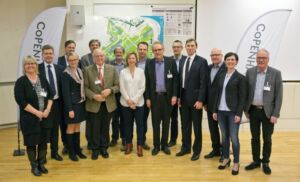News
Inaugural Greater Copenhagen meeting tackles border control
This article is more than 9 years old.
Committee: Metropolis needs free movement between Denmark and Sweden

The board of the Greater Copenhagen & Skåne Committee met for the first time on Wednesday at Copenhagen Airport (photo: The Greater Copenhagen & Skåne Committee)
The newly-formed Greater Copenhagen and Skåne Committee, a political co-operation platform comprising all 79 municipalities and three regions in the Greater Copenhagen area and the Scania region of Sweden, met for the first time this week, taking the opportunity to issue a statement on what is without doubt one of its most pressing concerns: the border controls between Sweden and Denmark.
Competing with the big boys
Steen Christiansen, the mayor of Albertslund Municipality and chairman of the new committee, outlined the ambition to make the 3.9 million-inhabitant metropolitan region a competitor of the likes of Stockholm, Amsterdam and Hamburg.
“Separately we are too small to really make our mark internationally, but together we can generate the volume that is crucial for competitiveness,” he said.
“By establishing the Greater Copenhagen and Skåne Committee we place ourselves on the world map as a metropolis with highly-educated employees, a good infrastructure and strong sector clusters. We are world champions in green solutions, we have a medicinal sector in the international top class, and it is easy to run a business in Greater Copenhagen. We need to get that message out to the world so we can attract more international investors and companies.”
Border control: not the answer
But the recently implemented border controls dividing the Øresund have created a literal barrier to the region’s ambition of marketing itself as a unified work market, and it sees free movement between Denmark and Sweden as being a prerequisite for success.
“ID controls over the Øresund, with cancelled Øresund trains as a consequence, already constitute an inconvenience to commuters and companies and in the long-term risk growth, development and jobs. It will impact on our business community, our citizens and our possibilities for attracting international companies, talent and investments,” the committee wrote in a statement.
“The Greater Copenhagen and Skåne Committee understands that the current situation in Europe calls for extraordinary measures. But controls on internal borders is not the answer.”










































